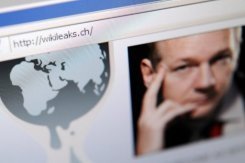

| Visitors Now: | |
| Total Visits: | |
| Total Stories: |

| Story Views | |
| Now: | |
| Last Hour: | |
| Last 24 Hours: | |
| Total: | |
Twitter users seek privacy in WikiLeaks case
 |
| © AFP/File Fabrice Coffrini |
ALEXANDRIA, Virginia (AFP) – Lawyers for three Twitter users asked a US judge to overturn a court order directing the microblogging site to disclose clients’ data to US authorities for a probe into WikiLeaks.
The order calling on Twitter to release data about the accounts of Icelandic lawmaker Birgitta Jonsdottir, US computer researcher Jacob Appelbaum and Rop Gonggrijp, a Dutch volunteer for WikiLeaks, was handed down in December by Judge Theresa Buchanan.
Buchanan, who also heard Tuesday’s challenge, ordered Twitter in December to hand over to the US government information on the three subscribers and any other clients linked to WikiLeaks, the organization led by Julian Assange that last year released a slew of US diplomatic cables.
Among the information Twitter was ordered to give to the government were Internet Protocol addresses and the names and addresses of “tweet” recipients.
The December court order was sealed — or secret — until last week, when the details were made public to allow Jonsdottir, Appelbaum and Gonggrijp the right to reply.
In a tweet sent to AFP, Jonsdottir said she was determined to fight for her right and the right of “other social media users” to privacy.
“I don’t have much choice, do I — nor other social media users,” she said when asked if she would hand over her Twitter account details to the US authorities.
“That’s why this has to be fought and discussed.”
American Civil Liberties Union senior lawyer Aden Fine, who was part of the team representing Jonsdottir, slammed the government for “attempting to obtain information about individual Internet communications and doing it in secret.”
“That’s not how our system works,” Fine told AFP.
In his arguments to Bunchanan, he added: “The government shouldn’t be able to get this information in the first place, and shouldn’t be able to get it in secret.”
Fine later said that “once the government gets the information, there’s no un-ringing of that bell.”
None of the Twitter users was in court for the hearing, but their lawyers also asked Buchanan to unseal, or make public, other still secret documents related to the December order.
Those documents are widely believed to contain information about more companies — including Google, Facebook and Skype — from which the US government has tried to collect client data for its WikiLeaks probe.
Asking for the data is “a standard investigative measure that is used in criminal investigations every day of the year all over the country,” said Assistant US Attorney John Davis, who argued the case for the government.
And Peter Carr, a Department of Justice spokesman, said that because the documents are sealed, it was “speculation that other companies were involved.”
The hearing was held as US Secretary of State Hillary Clinton gave a speech on Internet freedom at George Washington University in Washington, saying the United States is “committed to continuing our conversation with people around the world.”
“The demand for access to platforms of expression cannot be satisfied when using them lands you in prison,” Clinton said in the speech, referring to crackdowns on bloggers and Twitter users in countries like Syria or Iran.
Cindy Cohn of the Electronic Frontier Foundation noted that as Clinton spoke, “the US Department of Justice was trying to keep secret many of the facts of its investigation into the very mechanism that inspired the revolutions in Egypt and Tunisia.”
In Jonsdottir’s case, actions by the court and US government are “especially troubling” because they show a disregard for Icelandic law, which gives lawmakers in the Nordic country broad immunity, according to Cohn.
“Courts usually try to honor another country’s laws,” she said.
In a statement issued Monday, Assange called the US court order “an outrageous attack by the Obama administration on the privacy and free speech rights of Twitter’s customers.”
The judge did not indicate when she would make her decision.
Source:



